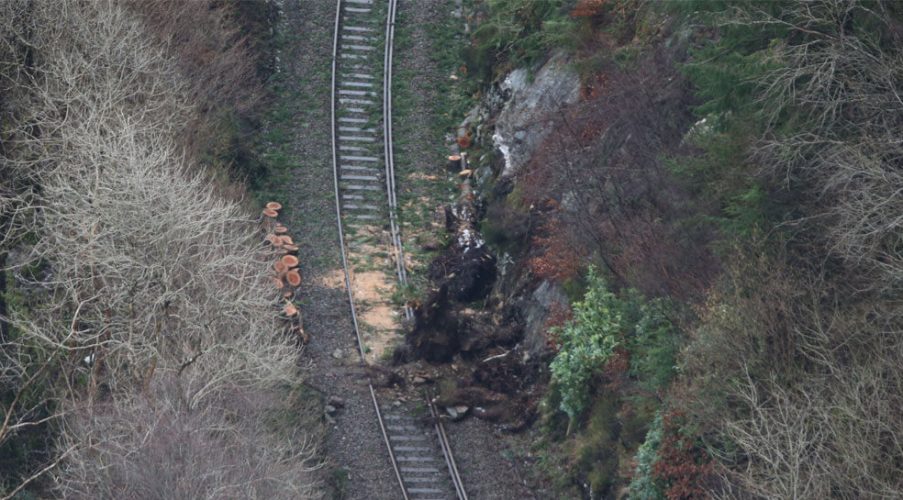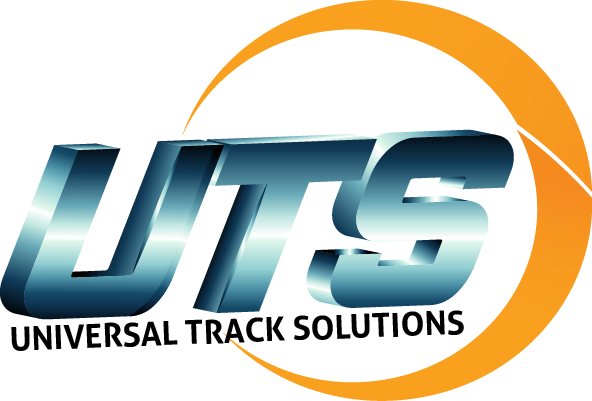How storms and flooding affect the railway

Very wet and windy weather can significantly impact the railway.
When this happens, our engineers work determinedly night and day to keep the railway open for your train services:
With wind and heavy rain forecast across Britain, Network Rail and train operators are preparing for the impact of severe weather.
There’s the potential for damage to overhead lines and tracks caused by debris or fallen trees, which could impact train services. If damage occurs, the high wind levels mean it may not be safe for engineers to work at height or with certain machinery until the wind levels have dropped. This could mean we won’t complete repairs in time for a normal Monday morning service.
We advise you to check before you travel and keep in touch with the latest information provided by train operators via their websites, apps and Twitter.
What does stormy weather do to the railway?
Floods, high winds and landslips can destroy railway infrastructure and block lines, so our teams repair damage and clear debris to ensure trains can continue to run.
Flood water in particular can pose problems on the railway. Water blocking the lines, as well as debris, silt and mud making its way onto the track, are only part of it. The lasting damage that flood water can cause to infrastructure can lead to ongoing repair work that takes days, weeks or even months.
If you live by the railway, please help us by securing any loose garden items that might blow on to the tracks.
Infrastructure impacts
Flood water can wash away ballast – the bed of stones that supports the railway sleepers. Such ‘washouts’ can make the line unsafe until it has been re-laid.Points and signalling equipment rely on intricate wiring and power supplies, which are extremely vulnerable to failure during flooding, and need replacing before services can run again. If the track has a live conductor rail, flooding can cause a short circuit.Sometimes flood water doesn’t stop trains running, but if water levels rise above the rails, trains have to reduce their speed to prevent damage to the train, which in turn can cause delays.Heavy rain can overwhelm the drainage systems on the railway, known as culverts, and make flooding more likely.
The effect of flooding on the railway and what we’re doing to reduce it
High winds
Gale force winds cause a real problem for the railway. This commonly comes in the form of debris blown onto the tracks, including trees or other forms of vegetation that delay trains while the line is cleared.
More seriously, trees that are blown down can hit overhead power lines (pictured), severing connections or in some cases knocking down masts entirely.
Managing vegetation by the railway
Landslips
Even once water seems to have receded, landslips are another risk that comes with such a volume of water.
Landslips happen when the water in the ground forces the grains of the soil apart so that the grains no longer lock together and the slope does not have enough strength to stand up, so begins to slip downhill.
Their frequency is strongly related to the weather. Long, wet periods often result in a lot of landslides. In some cases, these do not affect anyone and therefore do not get reported; however, when they affect roads, railways and other infrastructure they can cause great disruption.
Tonnes of wet earth, mud and other debris spreading onto the track is a huge problem, closing lines until the large obstructions can be safely removed.
Watch this film to find out more about landslips and how we monitor them to keep the railway and passengers safe – Folkestone Warren: The Great Fall to SSSI:
Forecasting
To be as prepared as possible, we receive forecasts through the Network Rail Weather Service and enact our Extreme Weather Response Process to prepare for the storms. We also receive alerts through our Flood Warning database, and can receive information from locations not covered by this by using bespoke river-level monitoring equipment.
Other tools look at the longer term management of flood risks to the railway, including the Washout and Earthflow Risk Mapping system (WERM) used by our geotechnical teams on each route. This identifies earthworks that are likely to be flooded and assesses the risk of this happening. The results can then be used to build a flood-warning database so that these areas are checked during any flood warnings that cover the route.
When a problem is forecast, we send people and equipment to at-risk areas to take action quickly.
Preparation
Being prepared is essential in helping to minimise disruption on the lines as adverse weather continues.
There are many ways that we prepare for and reduce the possibility of flooding, for example, including deploying flood defence systems such as inflatable barriers, and clearing branches and leaves from ditches and culverts on and near the railway.
Find out more information on the delays explained page.
Find out more
Weather resilience and climate change on the railway
Responding to weather impacts on the railway
Delays explained
Our seasonal track treatment and weather support machines
The post How storms and flooding affect the railway appeared first on Network Rail.



